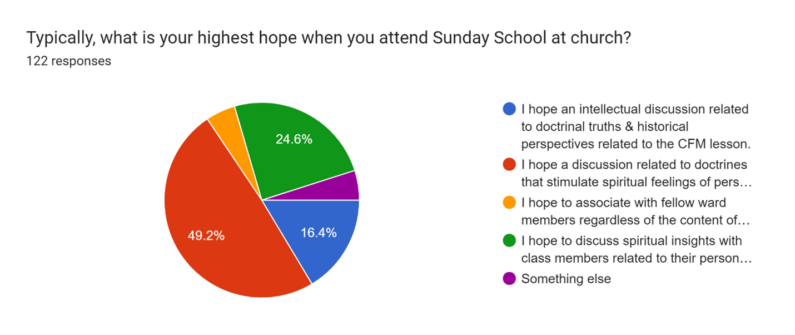I’d like to pivot back to a broader topic of the second hour in church.
Because of recent messages I have published via the newsletter, a few weeks ago I took a survey about what expectations you have for second-hour Sunday School.
Here are the results:

You can see the full questions here.
From my personal experience, the blue piece of pie (16.4% – I hope an intellectual discussion related to doctrinal truths & historical perspectives related to the Come Follow Me/CFM lesson) is what most Sunday School classes try to offer to the attendees.
And it is interesting to see the red piece (49.2% – I hope a discussion related to doctrines that stimulate spiritual feelings of personal redemption that offer me strength) is almost half of the responses.
The green piece, the second most popular option, (24.6% – I hope to discuss spiritual insights with class members related to their personal CFM study) is worth mentioning and considering.
So, what do we do with this data?
I don’t necessarily think any changes in a specific ward should result from a random, non-scientific survey on a Leading Saints newsletter.
The big takeaway is figuring out how a ward council can better understand the expectations their ward members have for the second hour.
From there, revelation can flow.
However, as I consider this data, it reflects my personal experience with Sunday School.
Most Sunday School teachers unduly feel pressure to present content that is intellectual in nature or gives some historical or cultural insight to a scripture passage.
However, if that is the type of information I want, I can get an unlimited amount of that type of information outside of the Sunday School class via popular podcasts or YouTube channels that discuss the CFM material with experts or educated PhD scholars.
But at church, I desire an experience that isn’t educational as much as it is redemptive.
I simply want to know what the doctrinal focus is for that lesson, how it relates to the redemptive power of Jesus Christ, and how it has changed others personally or offered them strength.
The ironic challenge in this effort is that it is actually harder for the teacher to study and present from an intellectual point-of-view compared to focusing on simple, redemptive doctrines of Christ; however, they typical go the intellectual route in their preparations because it isn’t as uncomfortable as trying to move the class in a direction of vulnerability.
That is where it takes finding the right ward member not to teach but rather to guide a discussion that brings personal stories of redemption and vulnerability.
(A great resource for a instructor to learn these skills is this interview with DeAnna Murphy)
Maybe a class member learned in a CFM podcast that the Hebrew translation for [insert biblical word] means [insert profound definition].
That’s interesting information; however, how did that information connect you to Jesus Christ and offer you further redemption and strength in your personal life?
Though it wouldn’t be my personal preference to attend a more intellectually focused class, it isn’t wrong for offering that option.
With many wards having multiple classroom options during Sunday School, it would be worth testing some different approaches and having the teachers clarify the intent for which they are aiming.
For example, when I have been asked to step in and teach Sunday School, I explain that this class will not be focused on intellectual information or scriptural history; but rather, on redemptive experiences individuals had related to the CFM content.
I assure them I will not be offended if they go to the other class.
Maybe some ward Sunday Schools would evolve to offering two larger classes focused on redemptive doctrines and then a smaller class where 8-9 people can go to listen to Brother Hansen, who has a minor in Hebrew studies.
This has been a fun topic to explore, and the overall point of it all is to encourage leaders in ways we can be more aware of ward members’ expectations and then offer them an experience on Sunday that they want to return to week after week.
Sincerely,
Kurt Francom
Executive Director
Leading Saints
P.S. This is an older newsletter message. Get the up-to-date message weekly by subscribing for free HERE.









